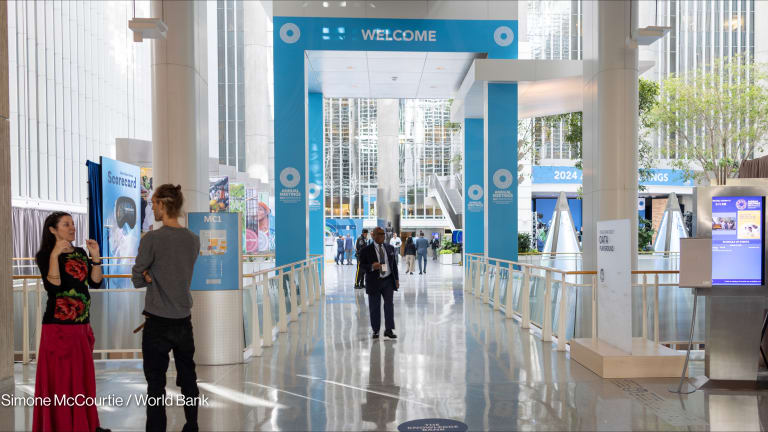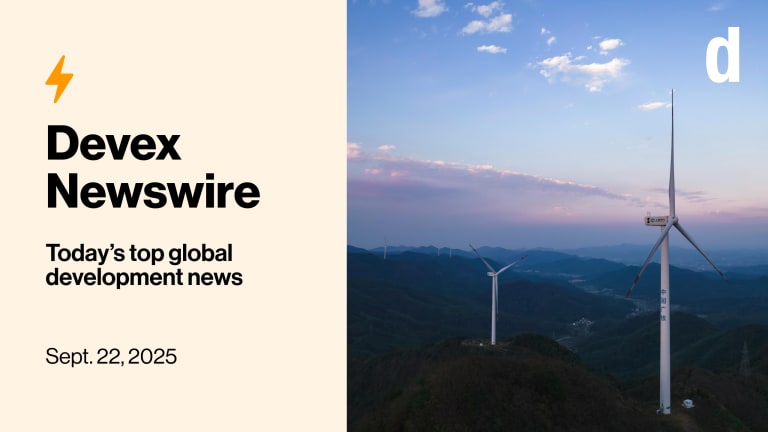
As the U.N. General Assembly meets this week to kick off the crucial debate on accelerating progress toward the Millennium Development Goals and looks to set the post-2015 development agenda, what should we expect?
The most important issues will most like be repleneshing the Global Fund to Fight AIDS, Tuberculosis and Malaria, transparency and energy poverty, according to Michael Elliott, president and CEO of ONE, the advocacy group co-founded by rock star Bono to eradicating poverty in Africa.
We spoke to Elliott the sidelines of the 2013 Social Good Summit about how technology has changed the public role in advancing development goals, and how ONE ensures effective use of new tools for engagement.
Here are a few excerpts of our conversation with the chief executive of ONE:
What is the ONE Campaign watching for this week, in the lead-up to the U.N. General Assembly meetings, on the discussions on the final two years of the MDGs, and the post-2015 planning process?
Ten years ago this was not like this at all. It was a very kind of closed conversation in which world leaders came into town, and it’s gotten wildly democratized and connected and it’s very, very exciting, because it means everyone has a chance to influence the agenda. It’s important that we remember that there are some short term things the community has to make sure we get delivered. Key for us is a very solid replenishment of the Global Fund, which is an absolutely vital institution in tackling AIDS, TB and malaria. It needs $15 billion in the replenishment. It’s going to be tough to get. Governments and others are going to have to step up and get it done. There’ll be a [Global Fund] replenishment sometime over the winter, and continuing to make the case of the centrality of the Global Fund in the global health conversation should be a critical thing this week.
A second theme a lot of people are going to be talking about… is transparency as a driver of transformation, a driver of development — transparency and accountability. We’ve done an enormous amount of work on the extractives industry. We were very much in the lead of getting 1504 into Dodd-Frank, which compels transparency on the extractives industries listed on the U.S. stock exchange… We really, really need to build an absolute solid global standard on transparency for the extractives regime…Then we’ve got to build out the transparency movement so it gets to “phantom firms.” “Cleptocrats” don’t just steal money. They have to put the money somewhere. They put it into phantom firms, whose ownership needs to be made public in registries so that we can all look at it. The continuing transparency revolution is going to be a theme of the week.
The third thing — which is a passion of mine — is energy poverty, which has risen to prominence in the U.S. in the last year with the Power Africa initiative and the Electrify Africa Act. I’d hope that we’ll get out of the week with the relatively small number of us that have been making a noise about energy poverty over the last year turns into a slightly larger chorus of people who realize that it is an absolutely critical issue to the transformation of poor societies, that they have power.
Despite the changes you mentioned, a lot of people look at the U.N. process and still see 192 member state representatives planning and meeting behind closed doors, with limited room for negotiation. Are the opportunities that you see opportunities for engagement, or are there also opportunities for really binding commitments that the public can have an impact on?
You’ve got to start somewhere. You have to start with engagement. You have to start with kicking in the door — or being invited in, which is more appropriate, being invited in and making your case as passionately as you can — and then hoping you get some kind of outcome in the end… You just can’t, if you are a leading figure in the UN or a leading figure among the key member states, it’s just not going to work to pretend that this is a closed club anymore. It’s just not going to work. I mean when Russia, chairing the G-20, does a “B-20” and a “civil society-20” and a “youth-20” — when even Russia does that? Something has changed. We can all do the — “how much has really changed? Don’t the key decisions still get made in smoke-filled rooms” … but you’ve got to start somewhere.
We do an inside-outside game like lots of other people do to. We both try and do very sophisticated inside the room lobbying and we put a global membership of three and a half four million people in service of that.
We’ve got this event tomorrow night, which I think is going to be knock-out. The response to it has been sort of incredible. Bono gave this talk at Ted in January when he talked about “factivism” and “factivists,” about a young generation of technology-enabled people in the developing world who are using technology to hold institutions accountable and make sure that we continue to drive the arrow of progress towards eliminating extreme poverty in 2030. What we’ve done is bring into town a bunch of “factivists,” eight people we’ve got up on a panel at the UN tomorrow, and the response to it — we had to close the doors, because 350 people in the U.N. system and elsewhere in town immediately signed up for it. I was a little nervous when we chose this as one of the public events we’d do this year, because it sounded a little nerdy, a little wonky. The people who are coming here are not household names at all, and the response has been completely overwhelming. That really tells you that something new is going on.
Everyone knows you can oversell the cellphone, you can oversell technology. We all know that. I know that. I used to work in the media. I’ve lived with technological disruption for the last 20 years. But it is also clear there are potentialities and possibilities that technology and connectedness gives us now that are very, very, very real, and which simply didn’t exist five, 10 years ago, and it changes the way you do everything… It’s pretty astonishing.
Is it new technology that’s driving these changes, or is it the result of looking at development differently?
We’ve always known that we wanted development processes to be country owned, people led, not imposed by the top down, constantly subject to monitoring evaluation and testing. There’s been no argument that that’s what we wanted to do. What’s happened, I think, is that we now have tools and technology, which enable us to start doing stuff effectively. Now, I don’t think we’re yet at the stage where we can say, “so, we did this accountability mechanism, we did this transparency mechanism with Program X. It’s brilliant, and so we’ve figured out how to scale it rapidly … Or alternatively, we did this transparency and accountability on Program Y, it didn’t work, and we’ve closed it down and we’re not going to do it anywhere else. I think we’re still in the process of finding out quite what the transparency and data revolution means. But we will get a little more information every month.
For you, and for the ONE Campaign, what would be a home run in terms of incorporating those new tools into a post-2015 development agenda?
Look, there’s a tension here. The simple way of answering that would be to say, “listen to what the people want.” Well we should. We should absolutely listen to what the people want. But we can’t simply just only listen to what the people want. There are a lot of people, they have lots of different voices, and some things are kind of genuinely pressing, even if some people don’t notice them. So, what’s a home run? I would say a home run is to inform, in a systematic way, our thinking about the post-2015 process by listening to what people want, while recognizing that there are many, many inputs that appropriately come into play in thinking what the 2015 will be. The difference this time around is that we have to, as one of those key inputs, we have to listen to what people want.
The thing that I really want, what would be a home-run for me for the post-2015 process would not simply be a terrific set of goals and targets, and by and large I think the MDGs managed that. It would be if the new climate of technology, of connectedness and transparency allowed people to feel that they owned them, that they owned the goals from day one and hence could hold their own governments accountable for the delivery of them. That would be terrific. If people felt from day one, these are mine. These are my development goals, and I am going to do what I can to make sure the people who I can hold accountable for seeing that they’re delivered deliver them.
You’ve talked about ONE’s “inside-outside” model for engaging the public and also engaging with policymakers, what would be your advice to others, who are looking at these tools and technologies that grant access to so many new voices, and wondering how to most effectively use them for their organizations and causes?
The message that I would send, which is sort of a slightly less Social Good Summit, Mashable, Sunday morning in New York at the 92nd Street Y lesson, would be: Don’t shortchange the inside game. We’re all going to — at Mashable this year — we’re all going to talk about the outside game. We’re all going to talk about the empowerment of technology and connectedness, so we got that. But I have, on staff, brilliant, brilliant government relations people, who knock on doors of Senate offices just like the [National Rifle Association] do, and they’re good. I have a team in Brussels who can pick up a phone to the key staffer of every relevant commissioner in Brussels and get them on the phone and say, “this clause in this directive needs to be changed, and here’s the language.” And it’s really important that we remember that. The inside game really counts. It helps when you’ve got the world’s most remarkable activist, lobbyist, campaigner as co-founder of your organization. That helps. He is pretty amazing with this, as you know.
So it helps when you’ve got someone who can play the inside game as well as he does. Not everyone has that. I understand that. I take making sure that we do the inside game really seriously. So, one thing to remind people as we get appropriately excited by cell phones and apps and all of the other things is: you’ve got to be able to know who the chief assistant to the assistant chief of the subcommittee on the standing subcommittee and so on.
Tune in to Devex to get updates on all the global development events happening in New York, from the Clinton Global Initiative to the Social Good Summit and the United Nations General Assembly.
Read more development aid news online, and subscribe to The Development Newswire to receive top international development headlines from the world’s leading donors, news sources and opinion leaders — emailed to you FREE every business day.








